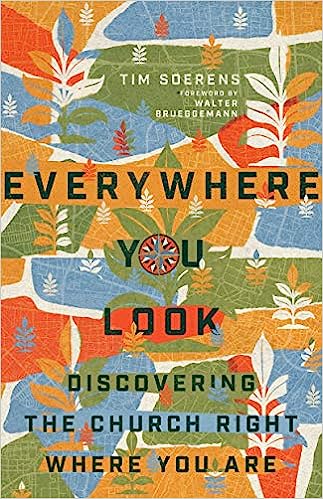This week, we are in Chapter 6 “The Same Team” of Tim Sorens’s book, Everywhere You Look: Discovering the Church Right Where You Are.
Whose Team?:
The very first topic that Paul tackles in 1 Corinthians is divisions within the Church. 1 Cor. 1:10-17. Paul writes: “What I mean is that each of you says, “I belong to Paul,” or “I belong to Apollos,” or “I belong to Cephas,” or “I belong to Christ.” Has Christ been divided? Was Paul crucified for you? Or were you baptized in the name of Paul?” vv.12-13. Divisions within the Body of Christ create multiple problems for our carrying out God’s Dream in the World. If God is the Big Why, then God is our team and not our denomination or our congregation.
Who We Are:
First, as Sorens has emphasized throughout his book and particularly in the last chapter, the local church is called to become an attractive community. We are intended to be something different than the world around us. We are intended to create a culture and community that demonstrates that the gospel is true here, true now, and true in this place. p.73. Church divisions, particularly those that mirror the divisions in society, make the gospel a lie. If we vilify our fellow Christians and create a community based on a mutual dislike of the other, then what do we have to offer the world as an alternative way of being? p.86. The local church simply cannot allow itself to mirror our increasingly polarized culture based on mistrust and mischaracterizations. p.85. But, as Sornens will write about later in this chapter, however, unity does not mean uniformity and uniformity is not our calling.
What We Do:
Divisions also prevent us from seeing what the Spirit is doing in our parish and joining in. If we are competing with other Christian groups, even if the competition is respectful, then our ability to be a gospel force of reconciliation and healing in our local community is inhibited. But if we envision ourselves as being on the same team as the Presbyterians or the community churches, then we can truly join with the Spirit and offer ourselves in collaboration and participation with what is already going on. The Parish Collective’s video (#4) on Collaborating for the Renewal of God has a good discussion on this issue.
How We Grow:
Finally, Sorens sees the local congregation as a marriage. Sorens defines marriage as a process of confronting reality and growing up as a people within a committed relationship. p.84. The goal of marriage is not self-actualization but maturity, wholeness, and shalom. pp.84-85. As we looked at in our discussion of Genesis 2, no one can be a “person” in isolation. Personhood (from the Greek prosopon meaning to “face or look towards”) requires a relationship. This growth does not require uniformity, but an understanding of how to maintain unity within diversity and a broadening our our perspectives.
I have attached Chapter 4 of Will Willimon’s recent book Don’t Look Back which he wrote in response to the recent strife in the United Methodist Church. In the chapter, and particularly on pages 60-64, Willimon demonstrates how spiritual diversity without divisions is necessary for any church. He writes that “a sad aspect of our denominational (UMC) splitting is the loss of interlocutors who see things differently than I.” p.61. He goes on to point out that there are four gospels which demonstrates that “The church in its wisdom knew there was no way to have a unified, singular witness without silencing someone’s witness.” p.62. We cannot grow in Christ unless we actively listen to those to whom Christ has spoken to in different ways than he has spoken to us. Being on the same team does not mean that we all think alike ro experience God similarly, but simply means that we recognize the same leader.
MESSIAH NOTES:
The final listening session with Rick Stall, our Senior Warden, and Kristi Burch, the chair of our Steering Committee, is this Saturday at 10 a.m.
Dinner is at 6. The menu is Chicken and Biscuits. Discussion about 6:45. Compline at 8. Hope to see you here.
The glory which thou hast given me I have given to them, that they may be one even as we are one, I in them and thou in me, that they may become perfectly one. John 17:22-23.
Now the works of the flesh are plain: . . . jealousy, anger, selfishness, dissension, party spirit, envy . . . and the like. Gal 5:19-21

